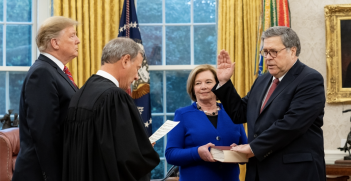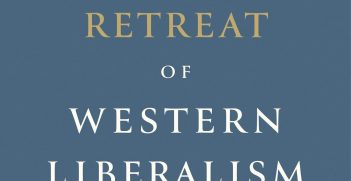The Fragile Foreign Policy of Donald Trump

Just days into the Trump presidency’s fourth year, the United States (US) teetered on the brink of war with Iran, in no small part due to the fragile state of mind and foreign policy of Donald Trump. It’s been said that the president’s foreign policymaking is incoherent, or even irrational, but is this really the case?
In June 2016, Northwestern University psychology professor Dan P. McAdams penned an article in The Atlantic titled “The Mind of Donald Trump.” Published as the presidential campaign was beginning in earnest, McAdams adopted a cautionary stance, detailing the potentially alarming personality traits of a man who went on to become the 45th US President.
McAdams’ evaluation garnered attention, not least because it was part of a larger debate surrounding the so-called “Goldwater rule” of the American Psychiatric Association (APA), issued by the APA’s Principles of Medical Ethics in 1973. The rule exists to deter psychiatrists from offering a professional opinion about public figures they have not personally examined. In the years that followed, the Goldwater rule was largely accepted as doctrine. However, in 2016, with the enigmatic rise of Donald Trump to the presidency, things began to shift.
Experts including McAdams, former CIA profiler Jerrold Post, Yale forensic psychiatrist Bandy Lee and numerous others, have rebutted that the APA guideline is “more of a principle” than a rule. They argue that Donald Trump’s psychological profile makes him unfit to lead. With a dangerous psyche comes dangerous foreign policymaking, and it appeared to have reached a zenith with the order to assassinate Qasem Soleimani. Iran and the US have thus far avoided an escalation to war, but the ramifications for Trump’s unilateral action against Soleimani are far-reaching.
This is certainly not the first time that Trump’s foreign policy decisions have been viewed with scepticism. However, targeting Soleimani – publicly justified as a reaction to an “imminent threat to American lives” – reaffirmed Trump’s personal stamp on the current administration’s foreign policy. While other factors, especially pressure from White House anti-Iran hawks, Secretary of State Mike Pompeo and National Security Advisor Robert O’Brien, should not be underestimated, Trump’s actions may be fuelled by a sense of fragility from the upcoming Senate impeachment trial. It’s a state of being he is largely unfamiliar with, and it leads him to make rash foreign policy decisions which reaffirm his “strength.”
Many of Trump’s most outlandish foreign policy moves (recognition of Jerusalem as the capital of Israel; initiation of bilateral talks with North Korea) are made in accordance with his “narrative identity,” a concept which stems from social psychology. It suggests that a person internalises a sense of “self” based on their surroundings, early interactions and relationships, which then manifests in the stories they tell.
Trump’s narrative identity was embodied in his 1987 memoir, The Art of the Deal. He seeks to attain a Darwinian ideal, writing of a need to denigrate the competition, to “think big” and “fight back.” It’s a mentality Trump has cultivated over his lifetime, and which assisted his presidential bid in 2016. Trump seeks to view himself as a “victor” over his presidential predecessors. This has frequently spilled over into his foreign policy decisions, which are motivated by a pathological need to act – and tweet – in a way which reaffirms his triumphs.
Trump’s December 2017 declaration that the US would henceforth recognise Jerusalem as the capital of Israel and begin to relocate their embassy evidenced this highly personalised method of foreign policymaking. It could be argued that Trump was motivated by a two-level game, contemplating his decision internationally, while domestically seeking to appeal to an evangelical Christian, pro-Israel lobby. It could also be suggested that, as Trump publicly stated, the move was motivated solely by a desire to facilitate eventual settlement of the Israel-Palestine dispute.
But the timing of this statement, much like the Soleimani assassination, was crucial. Former adviser on the Middle East in the Bush I, Clinton, and Obama administrations, Dennis Ross, suggested that the move was made without convincing context, and certainly without consultation with Arab states which could soften the blow of such a decision. The only visible precursor seems to be Trump’s May 2017 visit to the Western Wall in Jerusalem’s Old City, something no sitting US president had previously undertaken. So rather than basing his actions on international or domestic needs, Trump framed his decision in terms of his personal politics; his need to check off another box in his victor’s narrative, and to do what other presidents had been unable to.
Two years later, both the order to target Soleimani and the decision to avoid escalation with Iran are reminiscent of Trump’s Jerusalem statement. Trump has sought to prove his capability of sending a strong message to Iran. As Dr. Lee has argued, he “is extremely drawn to actions that would help him appear as if he has mental capacity, such as a ‘presidential strike’ against an enemy, while avoiding the proper procedures, such as briefing with Congress, that might expose his lack of capacity.” It stands to reason that with the stress of an upcoming impeachment trial, the latest in a series of enemies to be defeated, Trump feels a need to act unilaterally, out of self-preservation, and in line with his narrative.
Making foreign policy calculations based on one’s own narrative identity should be considered imprudent, but it is the modus operandi by which Donald Trump operates. His narrative identity has long framed a fragile brand of foreign policymaking, and it’s likely that his actions towards Iran may be less about international politics than a brash retaliation against the stress of an upcoming impeachment trial – a show of force – at least to his domestic supporters. If history is anything to go by, Trump will continue his battle toward victory, but for the remainder of his presidential term, it is likely to be uphill.
Natasha Kosev is an intern at the Australian Institute of International Affairs National Office. She is currently completing a Master of Diplomacy at the Australian National University, where her sub-thesis focuses on the use of strategic diplomacy as a framework for understanding external state influence in Afghanistan.
This article is published under a Creative Commons Licence and may be republished with attribution.





